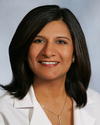BURLINGTON, MA—An annual physical exam can be challenging for many and may cause some nervousness—fear of what may be diagnosed, what doctor might find, blood pressure and pulse rate? What do they all mean? The physical exam can be even tougher for women.
 Dr. Sonal Mankodi, MD, who will be talking about this subject at Mega Health & Wellness Expo on Sunday, April 3, in Burlington Marriott Hotel in Burlington, MA, here talks about physical exam for women.
Dr. Sonal Mankodi, MD, who will be talking about this subject at Mega Health & Wellness Expo on Sunday, April 3, in Burlington Marriott Hotel in Burlington, MA, here talks about physical exam for women.
INE: What are the components of a physical exam for a female?
Dr. Sonal Mankodi: Start with getting history from a patient about their current and past medical issues, their medications, allergies, their health habits (e.g. smoking, alcohol, and exercise), family history of illnesses.
The physical examination is a general evaluation of the major organ systems such as the eyes, ears, thyroid, heart, lungs, abdomen, and circulation. A breast exam and pelvic exam is usually also part of the physical for most women. Pap smear is done on women age 21-65 at intervals of 3-5 years.
INE: Should the patients do any prepration/ground work before the exam?
SM: It’s always helpful for the patient to have a list of their current medications (over the counter as well as prescription and herbals/complimentary meds).
It’s also useful to have a list of any ER visits, hospitalizations, lab/test or Specialist visits that have occurred since the last Physical.
While the Physical Exam is usually focused on wellness and prevention, if there are any specific questions or issues that a patient has, it’s important to bring those to the attention of the doctor so that they can be attended to either at this visit or a follow up visit.
INE-What are the current guide lines for a physical exam?
SM: As above, the guidelines recommend focusing on wellness and prevention: blood-testing /labs /ekg/mammogram/pap etc. Routine EKG and urine tests are no longer supported by guidelines to be part of a routine Physical.
Pap smears are recommended every 3-5 years for women aged 21-65. Mammogram frequency has recently been revised for average risk women to now be recommended every 1-2 years, based on age.
Labs for a physical often depend on your age, your medical history and your family history and may include things such as: Fasting blood sugar, Lipid profile (cholesterol, HDL, LDL, Triglycerides), Electrolytes, Kidney function tests, Urine test (if you have certain medical conditions such as diabetes, or high blood pressure), Thyroid blood test, c-vaccines needed.
For all adult females, the vaccinations recommended include a Tetanus vaccine every 10 years and flu vaccine yearly, For women over age 60, Shingles vaccine is recommended. For women over 65, the pneumonia vaccine (a series of two vaccines, given 1 year apart) is recommended.
Board certified Dr. Mankodi specializes in internal medicine and primary care at Danvers, MA-based North Shore Physicians Group. She us a graduate of Harvard Medical School and did her residency Brigham and Women’s Hospital. Her clinical interests include menopause and perimenopause and Osteoporosis.
The Health Expo is organized by INE MultiMedia, a non-profit company devoted to education, empowerment, enrichment and entertainment, in collaboration with INDIA New England News. The expo, which is sponsored by Harvard Pilgrim Health Care, Lahey Health, Cambridge Health Alliance and Neem Spa, is free to all attendees.

